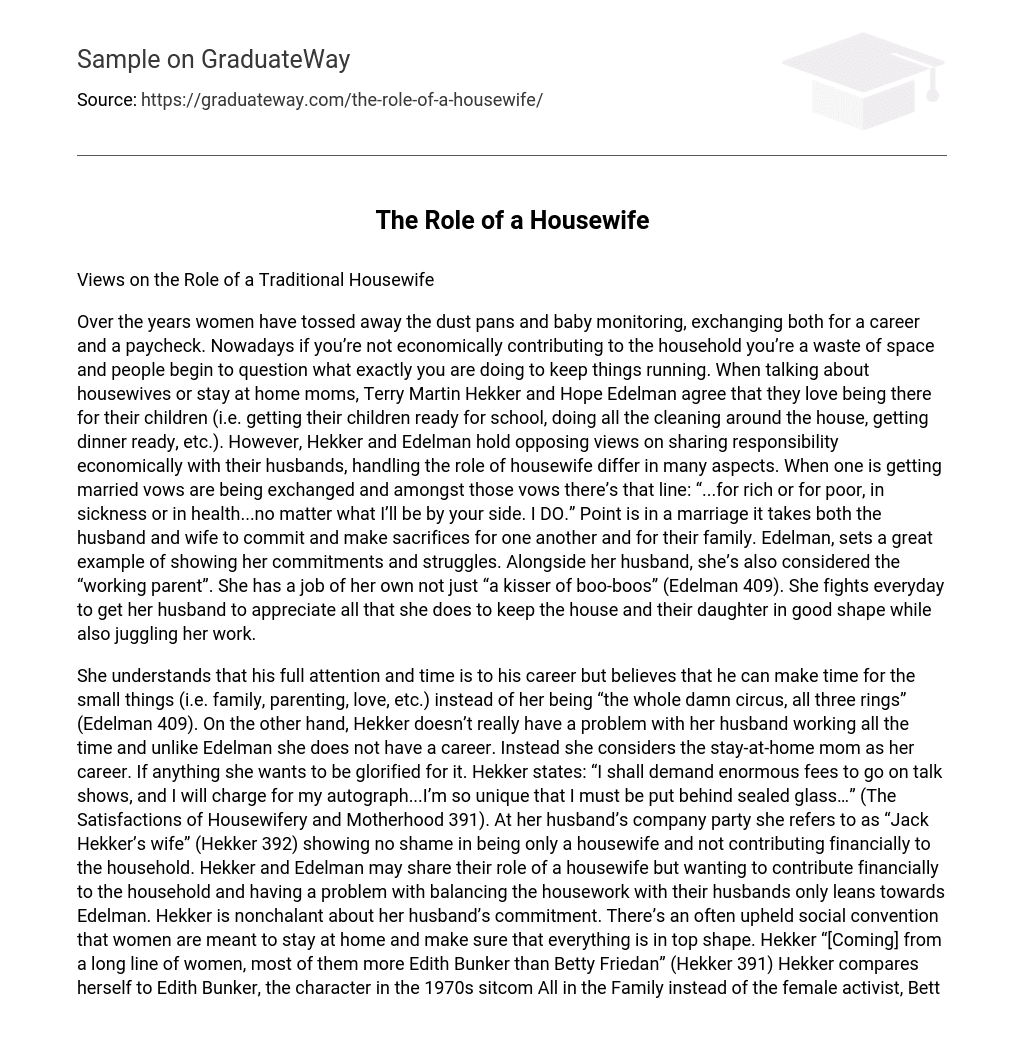Views on the Role of a Traditional Housewife
Over the years women have tossed away the dust pans and baby monitoring, exchanging both for a career and a paycheck. Nowadays if you’re not economically contributing to the household you’re a waste of space and people begin to question what exactly you are doing to keep things running. When talking about housewives or stay at home moms, Terry Martin Hekker and Hope Edelman agree that they love being there for their children (i.e. getting their children ready for school, doing all the cleaning around the house, getting dinner ready, etc.). However, Hekker and Edelman hold opposing views on sharing responsibility economically with their husbands, handling the role of housewife differ in many aspects. When one is getting married vows are being exchanged and amongst those vows there’s that line: “…for rich or for poor, in sickness or in health…no matter what I’ll be by your side. I DO.” Point is in a marriage it takes both the husband and wife to commit and make sacrifices for one another and for their family. Edelman, sets a great example of showing her commitments and struggles. Alongside her husband, she’s also considered the “working parent”. She has a job of her own not just “a kisser of boo-boos” (Edelman 409). She fights everyday to get her husband to appreciate all that she does to keep the house and their daughter in good shape while also juggling her work.
She understands that his full attention and time is to his career but believes that he can make time for the small things (i.e. family, parenting, love, etc.) instead of her being “the whole damn circus, all three rings” (Edelman 409). On the other hand, Hekker doesn’t really have a problem with her husband working all the time and unlike Edelman she does not have a career. Instead she considers the stay-at-home mom as her career. If anything she wants to be glorified for it. Hekker states: “I shall demand enormous fees to go on talk shows, and I will charge for my autograph…I’m so unique that I must be put behind sealed glass…” (The Satisfactions of Housewifery and Motherhood 391). At her husband’s company party she refers to as “Jack Hekker’s wife” (Hekker 392) showing no shame in being only a housewife and not contributing financially to the household. Hekker and Edelman may share their role of a housewife but wanting to contribute financially to the household and having a problem with balancing the housework with their husbands only leans towards Edelman. Hekker is nonchalant about her husband’s commitment. There’s an often upheld social convention that women are meant to stay at home and make sure that everything is in top shape. Hekker “[Coming] from a long line of women, most of them more Edith Bunker than Betty Friedan” (Hekker 391) Hekker compares herself to Edith Bunker, the character in the 1970s sitcom All in the Family instead of the female activist, Betty Friedan. Hekker states that she is like the women in her family where there was a majority of “Bunker’s”. They were traditional stay-at-home moms, and they took great pride in what they were.
Hekker enjoys taking care of her children and not many people understand that. Just like Hekker, Edelman enjoys taking care of her child, but she does not want her marriage to end up like her parents. Her father would come “home from work in time for dinner. He sat at the kitchen table once a month and pay bills. And, on weekend trips, he drove the car”(Edelman 409). However her “mother seemed to do everything. Everything. Carpooling, haircuts, vet appointments…-the whole roll call for a house wife of the 1960s and 1970s” (Edelman 408). Edelman expresses her thoughts and feelings about what was happening to her marriage: “When it became clear that my husband and I were not achieving the kind of co-parenting I’d so badly wanted…I felt duped and infuriated and frustrated and, beneath it all, terribly, impossibly sad/ [My husband] absorbed his own world of work, me consumed by mine at home. My parents all over again” (Edelman 410). She wants to have that fifty-fifty contribution. These women might share the fact that they both compare their lives with their past family experiences but how they view it is distinctively different.
Neither Hekker nor Edelman is right, nor are they wrong. They each enjoy doing what they believe to be best for them and their families. Hekker has no shame on her role of a housewife yet, she tends to fib about staying home and taking care of her own children. Instead she said she was taking care of the children of her dead sister. She realized that “you are considered ignorant to stay home to rear your children, [but] it is quite heroic to do so for someone else’s children” (Hekker 362). For Edelman “What really matters now- more than everything being absolutely equal” (Edelman 413), she only wants fairness and respect from her husband and a loyal father to her daughter (one that will be in time to tuck her in and to be there on their first family vacation.)
In today’s society it is rare to see a traditional housewife what we normally see are mother’s working in their own careers but also adding on that the role of a housewife. We look down on the actual stay-at-home moms and praise the moms who can balance both work and housework. The views of both Hekker and Edelman help us understand how different the same role can be between two women. One feels “like an endangered species” (Hekker 392) and the other just wants “to release the dream of completely equal co-parenting” (Edelman 413).





